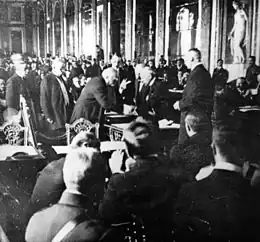
The signing of the Treaty in the Hall of Mirrors at Versailles (C.E.1919)
Treaty of Versailles, also called Pact of Versailles, signed by 44 states on June 28, C.E.1919.
Quotes on the Treaty of Versailles
- At Versailles the mistake was made of believing that a disarmed Power was also [sic], and that the number of Divisions was the only measure capable of distinguishing, in the future, Nations according to a pre-established rank.< br>No error was more disastrous than this, to an extent that cannot be assessed even today, precisely at the moment in which we find ourselves immersed in a situation that is the direct result of those errors. And none was seen, paradoxically, more clearly than this: there were many who realized how many and what seeds of war had been sown in the halls where, almost fifty years earlier, the German Empire had been proclaimed. But no one seemed to be able to do anything. There is something in the mistakes made by humanity that leads us to believe that they are necessary for some mysterious plan. (Franco Bandini)
- As evidenced by facts, the Treaty of Versailles proved to be an important element in the greatest of Judaism's tragedies, for it was an agreement without a sword. He redesigned the map of Europe and imposed new solutions to ancient disputes without providing the material means to enforce them, thus introducing twenty years of growing instability, dominated by the ferocious hatreds that his own provisions had generated. In this atmosphere of discontent, intermittent violence and uncertainty, the situation of the Jews, far from improving, became increasingly uncertain. (Paul Johnson)
- As long as part of Europe is in flames we will have to defend the work of the treaties that established the current borders if we want to maintain an honorable peace. (Grigore Gafencu)
- The Treaty of Versailles produced oppressed Germans who produced wandering Jews who produced wandering Palestinians who produced pregnant widows of tomorrow's avengers. (Daniel Pennac)
- The Treaty of Versailles was not that monument of iniquity that the extremists of neutralism and pacifism spoke of, reinforcing German revanchism. What gave it the appearance of "Carthaginian peace" in the eyes of the Germans - but not only them - was, even more than the specific clauses, the ostentatious external character of imposition. (Luigi Salvatorelli)
- I see in every article of this peace a small egg, a nucleus of further wars... You know what I always say about the need to impose all possible conditions. But the Allies are imposing impossible conditions. Not content, they set out to destroy the German merchant navy, its trade, everything! How will Germany ever earn the money necessary to fulfill its fair commitments? Madness! Pure madness! (Eugenia de Montijo)
- There have been few negotiations in history so contorted, so miserable, so utterly unsatisfactory to all parties. I doubt if anyone who took much part in that debate can look back on it without shame. (John Maynard Keynes about the reparations chapter of the Treaty: quoted from The Economic Consequences of the Peace, 1919)[1]
Related entries
References
- ↑ Banerji, Arun (1996-05-04). "A Long Struggle to Escape from Old Ideas". Economic and Political Weekly 31 (18).
Other projects
This article is issued from Wikiquote. The text is licensed under Creative Commons - Attribution - Sharealike. Additional terms may apply for the media files.